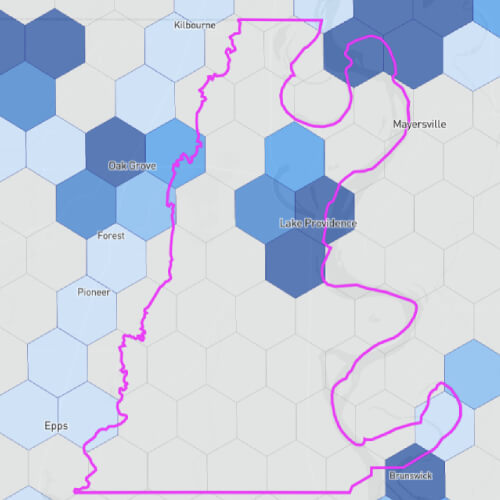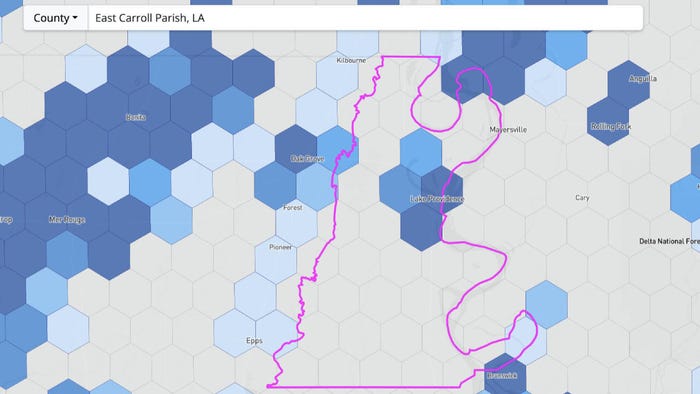Conexon to launch first community broadband project in East Carroll, Louisiana
Conexon – which typically builds fiber networks for electric co-ops – announced a new partnership with local organizations in East Carroll, Louisiana, to launch its first community broadband project.

Conexon, which typically partners with rural electric cooperatives to launch broadband networks, is planning to deliver its first community broadband partnership project, in East Carroll Parish, Louisiana.
In a press release, the company says it was selected by "a consortium of community organizations" to build and operate a fiber network across the parish that will connect approximately 1,500 homes and businesses. Chief among those organizations is Delta Interfaith, a community group working to close the digital divide in East Carroll. Delta Interfaith received a $50,000 grant from the non-profit impact fund Connect Humanity to support broadband deployment and digital education. That grant will be matched with funds raised by Delta Interfaith, according to Connect Humanity.
Conexon was also previously awarded funding through Louisiana's Granting Unserved Municipalities Broadband Opportunities (GUMBO) program ($4 million), as well as the FCC's Rural Digital Opportunity Fund, or RDOF ($2.5 million over ten years) to build fiber in portions of East Carroll Parish.
But unlike in the other communities it serves, there's no electric cooperative to partner with in East Carroll. Conexon has an existing partnership with Northeast Louisiana Power Company (NELPCO), as part of its RDOF build. However, as Conexon partner Jonathan Chambers explained in a conversation with Light Reading, roughly 90% of East Carroll is outside of NELPCO's service area.
Figure 1:  As per the latest available FCC broadband mapping data, at least 30% of East Carroll Parish locations (outlined in pink) are unserved by wired broadband of 25/3 Mbit/s.
As per the latest available FCC broadband mapping data, at least 30% of East Carroll Parish locations (outlined in pink) are unserved by wired broadband of 25/3 Mbit/s.
(Source: FCC National Broadband Map)
That fact, along with a history of East Carroll lacking basic Internet services, has led the community consortium to collaborate with Conexon on creating a broadband cooperative. According to Chambers, the model would see the community own the fiber infrastructure and lease it to Conexon to act as the operating arm. It's similar to how the company works with electric cooperatives – just minus all the helpful existing infrastructure and rights of way that come with said co-ops.
"We're borrowing from the electric cooperative history. And we're trying to see if in a place where there's not an electric cooperative, could a broadband cooperative be formed, owned by the community, operated whether by us or someone else? We're just trying to enable it to happen," said Chambers.
Of course, community-led broadband networks have popped up in myriad other regions across the country that have been neglected by incumbents. The difference in having a partner like Conexon on such a project is scale: "We get better pricing on materials, we get better pricing on labor. We design networks, we own a splicing company, and it costs us less to build," said Chambers. Conexon builds "a thousand miles a week," he added.
The decision for East Carroll to partner with Conexon on a community broadband network is notable given the public dispute Conexon and Delta Interfaith had with Cable One's Sparklight last fall, after Sparklight launched a challenge against Conexon's $4 million GUMBO grant. (The state rejected Sparklight's protest in October 2022.)
"The delay that was forced upon us by Cable One... well, that's a strategy by the cable industry and the telecom industry. Delay things for long enough that people go away, they get tired," said Chambers. "They delayed things, which meant people lost a year to getting service. Which is shameful. But we're in this for the long term."
Next steps
According to Chambers, there's more work involved to bring this plan to fruition in East Carroll. The community groups will need to create a legal entity that establishes the broadband partnership, and it's not clear there's a direct way to form a broadband co-op in Louisiana without legislative action.
Chambers also suggested additional funding could be necessary and the community entity may apply for state BEAD (Broadband Equity, Access and Deployment) dollars once those grants come online.
But Conexon said it will start an estimated 12 months of construction in mid-2023, with initial customers expected to have service by Q4 2023. Conexon will deliver broadband service to the parish through its ISP arm Connect.
There's also on-the-ground action required to educate the community about the project and new provider. Wanda Manning, a digital navigator with Delta Interfaith, told Light Reading that means "going door-to-door knocking" to inform people about their broadband choices. She described East Carroll families having to drive 70 miles for healthcare services that they could otherwise be getting from home "if we had the right services that good, sustainable Internet could provide us."
Conexon's Chambers will also discuss the project this evening at a local church in East Carroll, along with representatives from Delta Interfaith and Connect Humanity.
His hope is to set a successful model for other communities in similar situations across the country.
"East Carroll Parish is the poorest parish in the state of Louisiana, which is one of the poorest states in the country. So my view is, if we can make it work in East Carroll, and we will make it work, that it should be a light unto others," said Chambers. "They would be able to see what can be done in a situation where there's not a willing electric cooperative, where there's insufficient broadband, where people don't trust the incumbent carrier because the incumbent carrier has had decades and has not yet met the needs of the community. Do it yourselves."
Related posts:
— Nicole Ferraro, editor, Light Reading, and host of "The Divide" on the Light Reading Podcast.
About the Author(s)
You May Also Like












